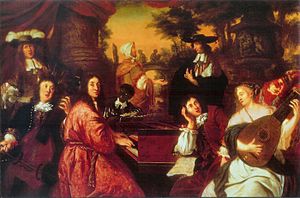Johann Theile facts for kids
Johann Theile (born July 29, 1646 – died June 24, 1724) was a German composer from the Baroque period. This was a time in history (roughly 1600-1750) when music was often grand and dramatic.
He is well-known for his opera Adam und Eva. This important work was first performed in Hamburg on January 2, 1678.
Contents
The Life of Johann Theile
Johann Theile first studied law in the cities of Leipzig and Halle. After that, he decided to focus on music. He learned how to compose music in Weißenfels.
Learning from a Master
His teacher was the famous Heinrich Schütz. Schütz was one of the most important German composers of the 1600s. Theile is thought to be one of Schütz's last students. Many people believe he was also one of the most talented.
Working as a Musician
Theile had many important jobs in music. From 1673 to 1675, he worked as a Kapellmeister (music director) for Duke Christian Albrecht. He also worked as a Kapellmeister in Wolfenbüttel. There, he learned more about music from Johann Rosenmüller. Rosenmüller had just returned to Germany after living in Italy for a long time.
Theile also worked in other cities. He was a Kapellmeister in Naumburg. In Berlin, he taught music to the royal family. He also taught music in Lübeck and Stettin. In 1673, he wrote a special piece called Matthäuspassion (St. Matthew Passion) in Lübeck.
Later Years and Legacy
In 1694, Theile worked as a music advisor for the Duke of Zeitz. After this, he returned to his hometown of Naumburg. He lived there until he passed away in 1724.
The Music of Johann Theile
Theile wrote many different kinds of music. His works include:
- Singspiele (operas with spoken parts)
- Operas
- Masses (church music)
- Psalm settings (music for religious texts)
- Passion oratorios (large musical stories, often about Easter)
- Arias (songs for one singer)
- Canzonettas (short, light songs)
- Sonatas (music for instruments)
- Motets (choral pieces)
His opera Adam und Eva was very special. It was the first work ever performed at the Goosemarket Opera in Hamburg. This was the first public opera house in Germany.
Teaching and Music Theory
Johann Theile was also a great teacher and writer about music. He wrote several books about music theory. These books often focused on counterpoint, which is about how different musical lines fit together.
He taught many students, including Johann Mattheson. One of his most important students was Dietrich Buxtehude. This is interesting because Buxtehude was nine years older than Theile!
See also
In Spanish: Johann Theile para niños
 | Selma Burke |
 | Pauline Powell Burns |
 | Frederick J. Brown |
 | Robert Blackburn |


